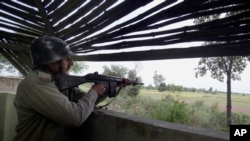Pakistan and India have continued to exchange heavy gun and mortar fire along their disputed Kashmir border, rendering almost non-existent a mutual cease-fire in the Himalayan region that has largely held since 2003. At least 24 civilians have died while thousands fled to safety on both sides since the violence broke out more than a week ago.
The deadly clashes are taking place along a densely populated 200-kilomter border referred to as the “working boundary” that separates Pakistan’s Punjab province from the Indian-controlled portion of the divided Kashmir region.
Each side blames the other for initiating the firing, but it is difficult to independently verify how the violence broke out. Islamabad and New Delhi are also accusing each other of intentionally targeting civilian populations.
Regional commander of the Pakistani border security forces, Major-General Khan Tahir Javed Khan says that more than 250 outposts and nearby villages have come under attack. He describes it as the most intense shelling from India in decades.
“Reasons best known to them (India) but they are becoming more aggressive with each passing day. The number of [cease-fire] violations, the number of rounds they have fired and the number of [Pakistani] posts and villages they have engaged that is increasing with each passing day. And the number of rounds which they have fired in five days, probably this much volume was not fired even during the actual wars between India and Pakistan,” said Khan.
The general insisted India started the conflict and urged the neighboring country to de-escalate, promising a swift positive response from Pakistan. There is no evidence either side is ready to back down as fresh civilian casualties were reported on Thursday.
Charges of 'infiltration'
Indian Defense Minister Arun Jaitley again suggested Pakistani forces had engaged in “unprovoked” firing to provide a cover for terrorist “infiltration.” Speaking on Thursday, he said the conflict appears to be aimed at expanding tensions to areas where it previously did not exist. The minister did not elaborate.
“Pakistan in these attacks has clearly been the aggressor, but it must realize that our deterrence will be credible. If Pakistan persists with this adventurism, our forces will make the cost of this adventurism unaffordable,” said Jaitley.
Pakistani commander General Khan dismissed Indian allegations of helping terrorist infiltrations as baseless.
“The type of infrastructure which you have (on the Indian side) in terms of barbed wire, the gate control with them, fully lit at night with poles at 100 meters distance each, four search lights on each pole and then the bunkers spaced 75 meters to 100 meters all along the working boundary. Now, one firing is taking place everyone is alert, the lights are lit. How would that be possible that during this period, intense firing and once everyone is alert, some infiltration can take place?” asked Khan.
Pakistan Prime Minister Nawaz Sharif called for a meeting of his top civilian and military officials on Friday to discuss the situation. Pakistani army commanders say that attempts to establish phone contacts or arrange meetings with their Indian counterparts, a usual practice under such circumstances, have not succeeded since the border clashes broke out.
The United Nations and U.S. officials have urged both the nuclear-armed rival nations to cease hostilities and resolve their disputes diplomatically through dialogue.




